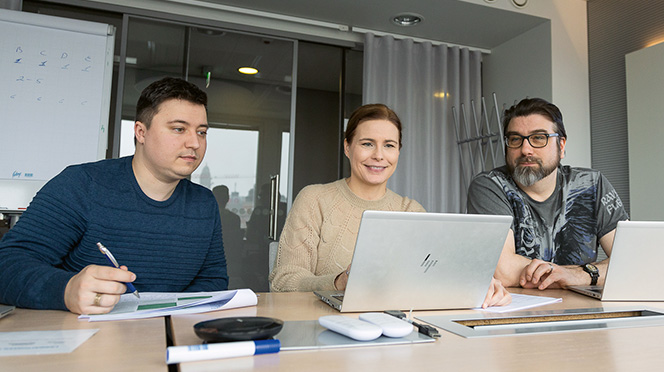Introducing the Hermes app – a new advocacy tool
Built as a tool for seasonal workers, the Hermes mobile application is being developed into a multilingual advocacy tool for all sectors represented by the Industrial Union.
The Hermes mobile application has been developed for foreign seasonal workers and their employers. The application provides information in five languages on terms of employment, employment law and living in Finland.
Industrial Union will permanently adopt the app, which was piloted in the agriculture and forestry sectors and developed in 2022 as part of the TYÖ2030 programme, once the project is completed.
“We are now considering how the basis of the Hermes project can be used to build an advocacy tool and what approach is the most sensible and cost-effective in terms of implementation,” Jyrki Virtanen, the Labour Market Director at the Industrial Union, says.
The plan at the first stage is to introduce the application to the technology industry. At the same time, the language options provided by the app will also be reviewed. At the moment, the Hermes app is available in Finnish, Swedish, English, Ukrainian and Russian.
“We want the application to become an advocacy tool for all the sectors represented by the Industrial Union. It will be another tool that supports the other tools in our arsenal,” Virtanen says about the longer-term plans.
Unique app
The idea for the Hermes application was created in spring 2021 by the Research Unit of the Industrial Union together with agriculture and forestry industry experts,” Anu-Hanna Anttila, Research Manager at the Industrial Union who led the Hermes project, explains.
The project was launched in February 2022. The project team worked together with partners such as employers’ associations, immigrant associations and authorities.
“It has been a pleasure to lead this project and to be a part of it. After all, everything happened rather quickly, in just over a year,” Anttila says.
According to a survey conducted before applying for project funding, there were no similar applications.
“Hermes is a unique innovation in working life,” Anttila says.
User-friendliness is the app’s key principle. Free to use, the app even works on older smartphones and does not collect any information about its users.
“Despite the tight schedule, we had the patience to test the application with users and improve it through feedback on user experience,” Anttila says.
In the future, the Hermes application will be made available for other unions, free of charge and on the condition that the purpose of the application will not be changed and the application will not be used for commercial purposes.
“All in all, I am very pleased with the Hermes application, which continues to develop in our hands,” Anttila says.
Overcoming the language barrier
In agriculture and forestry industries, where the app was piloted, foreign workers may account for up to 90% of all seasonal workers.
Riikka Vasama, Bargaining Specialist at the Industrial Union, specialises in foreign-born labour force and labour mobility.
“In the technology industry, too, there are many workplaces with a significant proportion of foreign workers,” Vasama says.
Employee representatives have reported that some workplaces struggle with overcoming the language barrier. As such, there is a need for a tool that can be used to inform all employees about terms of employment and union membership.
“Communication can be difficult even if the chief shop steward wants to help,” Vasama says.
The work is just beginning, but Jukka Saviluoto, Bargaining and Financial Specialist for technology industries at the Industrial Union, believes that Hermes has great potential.
“This is a great tool for explaining the provisions of collective agreements,” Saviluoto says.
For wider use
The strength of the Hermes app lies in the use of plain language. Collective agreements sometimes feature complex phrasing, but in the app, the information is presented in an easy-to-understand format.
Editing the texts on collective agreements of different sectors into plain language, creating different language versions and keeping the materials up to date require resources, but there is no other way in sight.
“Every industry we represent has its own unique collective agreement, so it is not possible to provide information that would apply to all sectors,” Vasama says.
The tried and tested application must now be widely adopted by both employees and employers in order to spread information on working life. As of March, the app had been downloaded more than 2,500 times.
Project Coordinator Henri von Adlerkrone from the Industrial Union says that the app is at the moment being marketed to young people.
“Students are looking for a summer job so we want to spread the word about the app to educational institutions, guidance counsellors and student unions,” von Adlerkrone says.
He also talks about Hermes at events organised by the union and local branches, as well as on courses at the Murikka Institute.
Download the Hermes app: www.hermesapp.fi/en

